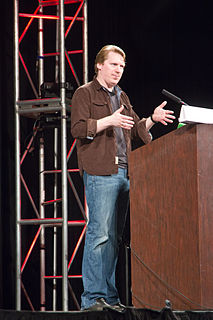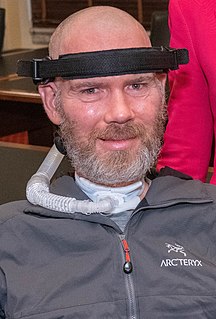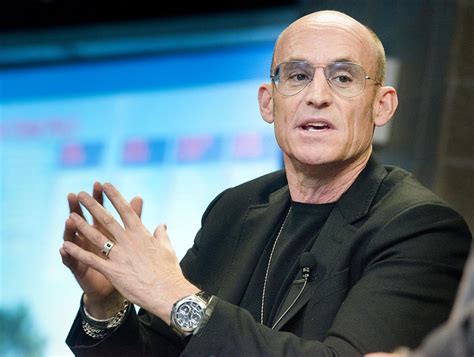Top 1200 Development Of Technology Quotes & Sayings - Page 15
Explore popular Development Of Technology quotes.
Last updated on November 18, 2024.
When you as a designer design something that burdens a community with maintenance and old world technology, basically failed developed world technology, then you will crush that community way beyond bad design; you'll destroy the economics of that community, and often the community socially is broken.
If you're using technology in a way that opens out conversation in your family, with your friends, with people you care about, I'm for that. But if you're using technology to silence the conversations with the people around you, then you have to create sacred spaces in your home, the kitchen, the dining room, the car.
I'm old enough to remember the advent of CD. You thought, "What's this piece of space age technology that's in front of me?" Now I ask, "When's the last time you bought a CD?" You see things come and you see things go, and you have to be on your toes and be nimble and stay with it, or you die. It's exciting. I love technology.
Oculus really started popularizing a new approach using cellphone screen technology, a wide field of view, and super-low-latency sensor tracking. It's not crappy stuff that doesn't work and makes everybody sick. When you experience Oculus technology, it's like getting religion on contact. People that try it walk out a believer.
Critics worry that if we spend time paying attention to that new kind of media or technology instead of talking to each other that that is somehow isolating. But humans are fundamentally social. So I think in reality, if a technology doesn't actually help us socially understand each other better, it isn't going to catch on and succeed.
I think that in a weird way, as technology gets more sophisticated, people have become less aware of it. It's become part of our day to day life. We're seeing large-scale projection mapping, like on buildings. There's video everywhere. It's much less noticeable that we're actually looking at technology.
By the time of the Singularity, there won't be a distinction between humans and technology. This is not because humans will have become what we think of as machines today, but rather machines will have progressed to be like humans and beyond. Technology will be the metaphorical opposable thumb that enables our next step in evolution.
History is littered with great firms that got killed by disruption. Of course, the personal computer, a technology that first took root as a toy, got Digital Equipment Corporation. Kodak missed the boat for a long time on digital imaging. Sony was slow to get MP3 technology. Microsoft doesn't know what to do with open source software. And so on.
The goals of development are always and everywhere stated in terms of consumer value packages standardized around the North Atlantic-and therefore always and everywhere imply more privileges for a few... Underdevelopment is the result of a state of mind common to both socialist and capitalist countries. Present development goals are neither desirable nor reasonable. Unfortunately antiimperialism is no antidote.
Through the art of personal development, we see an opportunity for these animals to inspire compassion, essentially creating a path to deep personal growth. This program [Animal sanctuary] will deploy ISF's youth development program, U Factor. The program helps youth identify their passion, cultivate their talent, amplify their purpose, and connect the younger generation to diminishing species and biodiversity.
I got to get the right people in the right job. Because a lot of costs can be taken out in the context of your administration without the legislature.For example, using technology to do more with less. Using technology to fight fraud. Reorganizing and streamlining can be done within the context of the administration.
Our missile technology, our equipment, is better than anybody by a factor of five. I mean look, we have, in terms of technology, nobody can even come close to competing. Now we're going to start getting it, because the military has been cut back and depleted so badly by the past administration and by the war in Iraq, which was another disaster.
I was always interested in technology. When personal computers came out, I was one of the first to pick one up and begin playing with it. My hobbies tend to be not about going fishing or hiking, but about playing on machines. Just like some people like helicopters and tanks and cars, I like technology a lot.
Holman's world is a worst case scenario but it's healthy to examine extreme possibilities. If the technology that is used for genetic enrichment in Genus had been distributed equitably, across society, it could have been nirvana, a great world where people don't fear the diseases that we die from. The problems that arrive are more to do with resource hording than technology itself.
The difficulty in today's world is our technology and science has outrun our theological advances. The reason for that is in technology and science, we have had the courage to ask the single question that theology has been afraid to ask: "Is it possible that there's something I don't know about this, the knowing of which would change everything?"
I am not a technophobe and I am using the latest technology today, some 30-odd years later, and I am really enjoying what some of the new technologies can offer. But at the same time I am always aware that one can get bogged down in that technology and that it can become more than just a method. That's something that you have to be slightly careful of.
The solution of present-day problems lie in the re-establishment of a harmonious relationship between man and nature. To keep this relationship permanent we will have to digest the definition of real development: development is synonymous with culture. When we sublimate nature in a way that we achieve peace, happiness, prosperity and, ultimately, fulfilment along with satisfying our basic needs, we march towards culture.
We have to do away with a false and misleading dualism, one which abstracts man on the one hand and technology on the other, as if the two were quite separate kinds of realities.... Man is by nature a technological animal; to be human is to be technological.... When we speak of technology, this is another way of speaking about man himself in one of his manifestations.
What Asia's postwar economic miracle demonstrates is that
capitalism is a path toward economic development that is potentially
available to all countries. No underdeveloped country in the
Third World is disadvantaged simply because it began the growth
process later than Europe, nor are the established industrial powers
capable of blocking the development of a latecomer, provided
that country plays by the rules of economic liberalism.
The Japanese don't write in alphabetic writing; they write in pictographs. So they never became visual, they stayed in the oral world, which is, everything is part of reality. Which means that they can accept any new technology? - ?it's not threatening to them, and they can still continue to maintain their traditional culture, even in the face of high technology.
They [women] can use their abilities to support each other, even as they develop more effective and appropriate ways of dealing with power.... Women do not need to diminish other women[they] need the power to advance their own development, but they do not "need" the power to limit the development of others.
We raised the matter of an agreement that was reached at the Growth and Development Summit, which was that we should access a certain part, 5% was mentioned, of the funds in the hands of the institutional investors, domestically, for investment in the real economy. That being an agreement of the Growth and Development Summit, we will engage South African business to see how we can make that a practical thing. So, there is a different set of engagement with local business.
If humanity is to survive, happiness and inner balance are crucial. Otherwise the lives of our children and their children are more likely to be unhappy, desperate and short. Material development certainly contributes to happiness - to some extent - and a comfortable way of life. But this is not sufficient. To achieve a deeper level of happiness we cannot neglect our inner development.
Development can indeed continue beyond childhood and youth, beyond the seventies. It can continue until the very end of life, given purposes that challenge and use our human abilities. . . . In sum, our development does not necessarily end at any age. We can continue to develop into our eighties, even to our nineties.
It is believed that physiognomy is only a simple development of the features already marked out by nature. It is my opinion, however, that in addition to this development, the features come insensibly to be formed and assume their shape from the frequent and habitual expression of certain affections of the soul. These affections are marked on the countenance; nothing is more certain than this; and when they turn into habits, they must leave on it durable impressions.
Now it’s either about technology that doesn’t work or about technology that’s used in bad ways. The anthology of the top twenty-five sci-fi stories in 1970 was, like, ‘Me and my friend the robot went for a walk on the moon,’ and in 2008 it was, like, ‘The galaxy is run by a fundamentalist Islamic confederacy, and there are people who are hunting planets and killing them for fun.’
When you as a designer design something that burdens a community with maintenance and old world technology, basically failed developed world technology then you will crush that community way beyond bad design; you'll destroy the economics of that community and often the community socially is broken.
If you're happy with where the Internet, Facebook, and Twitter have taken you, I'm not the Grinch. Someone called me Sherry Turkle's "evil Luddite twin." I'm not that. I enjoy the bounties of this technology. But if you fear that your connected life is running away with you, read the book, reflect, talk to your family and friends. I think we deserve better than some of the places that we've gotten with this technology.
[Internet] technology, like anything else that mankind creates is a tool and that tool can be used for good or for evil, like a light saber. Technology is supposed to bring people together, streamline things and make life easier and in a lot of ways it does that. However, technology can also disconnect you from other people and break down the social network, the real social network of family and friends and interpersonal communication, and isolate people, make them feel alone, make them feel small. So it's a tool that needs to be used correctly.
Technology today is the campfire around which we tell our stories. There's this attraction to light and to this kind of power, which is both warm and destructive. We're especially drawn to the power. Many of the images of technology are about making us more powerful, extending what we can do. Unfortunately, 95 percent of this is hype, because I think we're powerful without it.
So long as the processes of healing were not understood and man thought that the power to heal resided in substances and things outside of him, he logically sought for extrinsic means of healing, and a healing art was a logical development. The system of medicine, as we know it today, was a logical development out of the fallacy that healing power resides in extrinsic sources.
I've been in China enough to know that you shouldn't opine on it unless you speak Chinese and have lived there for twenty years. I wasn't pretending to be a China expert in that final chapter. I was just pointing, first to the parallels between Chinese behavior toward us and ours toward GB when we were at the same stage of development, and secondly to how much harder their development path is than ours was.
I have mixed feelings about how fast things are changing as a result of technology. There's no denying that through technology there are amazing things being created that help people with diseases or help people's dreams come true. But there's also this obsession. Social media is the most dangerous of them all.
Here at home, we need to do two fundamental things. Number one, we need to recognize that technology has moved on. The Patriot Act was signed in 2001, roughly. The iPhone was invented in 2007. The iPad was invented in 2011. Snapchat and Twitter, all the rest of it, have been around just for several years. Technology has moved on, and the terrorists have moved on with it.
Love in truth-caritas in veritate-is a great challenge for the Church in a world that is becoming progressively and pervasively globalized. The risk for our time is that the de facto interdependence of people and nations is not matched by ethical interaction of consciences and minds that would give rise to truly human development. Only in charity, illumined by the light of reason and faith, is it possible to pursue development goals that possess a more humane and humanizing value.
Technology can be our best friend, and technology can also be the biggest party pooper of our lives. It interrupts our own story, interrupts our ability to have a thought or a daydream, to imagine something wonderful, because we're too busy bridging the walk from the cafeteria back to the office on the cell phone.
The Far East is of particular significance for us in terms of this region's priority development. Over the last few years, let us say even over the last decades, we were faced with many problems here. We paid little attention to this territory although it deserves a lot more of it, because it concentrates great wealth as well as opportunities for Russia's future development.
Technology is such a broad kind of term, it really applies to so many things, from the electric light to running cars on oil. All of these different things can be called technology. I have kind of a love-hate relationship with it, as I expect most people do. With the computer, I spend so many hours sitting in front of a computer.
My hope is that digital technology will level things out more and that it will eventually eliminate favoritism. But technology cannot do it alone. The audience has to become more discriminating as well and not buy into every big tentpole movie because they have been brainwashed into thinking that's the movie to see.
I got to get the right people in the right job. Because a lot of costs can be taken out in the context of your administration without the legislature. For example, using technology to do more with less. Using technology to fight fraud. Reorganizing and streamlining can be done within the context of the administration.
What the new fertilizer technology has accomplished for the farmer is clear: more crop can be produced on less acreage than before. Since the cost of fertilizer, relative to the resultant gain in crop sales, is lower than that of any other economic input, and since the Land Bank pays the farmer for acreage not in crops, the new technology pays him well. The cost-in environmental degradation-is borne by his neighbors in town who find their water polluted. The new technology is an economic success-but only because it is an ecological failure.
Science is better paid than at any time in the past. The results of this pay have been to attract into science many of those for whom the pay is the first consideration, and who scorn to sacrifice immediate profit for the freedom of development of their own concept. Moreover, this inner development, important and indispensable as it may be to the world of science in the future, generally does not have the tendency to put a single cent into the pockets of their employers.

























































